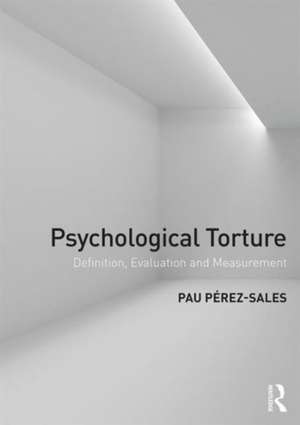Psychological Torture: Definition, Evaluation and Measurement
Autor Pau Perez Salesen Limba Engleză Paperback – 28 iul 2016
Ground in cross-disciplinary research across psychology, anthropology, ethics, philosophy, law and medicine, the book is a tour de force which analyses the legal framework in which psychological torture can exist, the harrowing effects it can have on those who have experienced it, and the motivations and identities of those who perpetrate it.
Integrating the voices both of those who have experienced torture as well as those who have committed it, the book defines what we mean by psychological torture, its aims and effects, as well as the moral and ethical debates in which it operates. Finally, the book builds on the Istanbul Protocol to provide a comprehensive new framework, including practical scales, that enables us to accurately measure psychological torture for the first time.
This is an important and much-needed overview and analysis of an issue that many governments have sought to sweep under the carpet. Its accessibility and range of coverage make it essential reading not only for psychologists and psychiatrists interested in this field, but also human rights organizations, lawyers and the wider international community.
| Toate formatele și edițiile | Preț | Express |
|---|---|---|
| Paperback (1) | 462.86 lei 43-57 zile | |
| Taylor & Francis – 28 iul 2016 | 462.86 lei 43-57 zile | |
| Hardback (1) | 1178.64 lei 43-57 zile | |
| Taylor & Francis – 28 iul 2016 | 1178.64 lei 43-57 zile |
Preț: 462.86 lei
Nou
Puncte Express: 694
Preț estimativ în valută:
88.57€ • 92.71$ • 73.72£
88.57€ • 92.71$ • 73.72£
Carte tipărită la comandă
Livrare economică 31 martie-14 aprilie
Preluare comenzi: 021 569.72.76
Specificații
ISBN-13: 9781138671553
ISBN-10: 113867155X
Pagini: 434
Ilustrații: 15
Dimensiuni: 174 x 246 x 29 mm
Greutate: 0.77 kg
Ediția:1
Editura: Taylor & Francis
Colecția Routledge
Locul publicării:Oxford, United Kingdom
ISBN-10: 113867155X
Pagini: 434
Ilustrații: 15
Dimensiuni: 174 x 246 x 29 mm
Greutate: 0.77 kg
Ediția:1
Editura: Taylor & Francis
Colecția Routledge
Locul publicării:Oxford, United Kingdom
Public țintă
Academic, Postgraduate, Professional, Professional Practice & Development, and UndergraduateCuprins
Acknowledgments. Index of Tables. Index of Figures. Section 1: Premises 1. Where things stand: the concept of torture and psychological torture. Section 2: The Voices 2. Intangible elements of psychological torture: learning from the voices of survivors 3. The definition of psychological torture in the testimonies of harsh interrogators and torturers. Section 3: Current Legal Perspectives 4. Psychological torture in international law 5. From dignity to identity: humiliation as a paradigm of the differences between legal and mental health perspectives 6. The Perpetrator’s psychological and legal rationale: motivation, intention and purpose. Section 4: Scientific Approaches to Defining Psychological Torture 7. Cataloguing Torture methods 8. The neurobiology of psychological torture 9. Trauma theory and the concept of psychological torture. Section 5: Psychological Torture Techniques 10. The roots of psychological torture in modern history: the slow road to convergence 11. Primary needs and relationship to the environment 12. Targeting the body to reach the mind: pain without marks 13. The limitations of normal interrogation in law enforcement procedures 14. Interrogation procedures in military intelligence gathering 15. The psychological manipulation of identity 16. Technological research and psychological torture. Section 6: A proposed definition and measurement of psychological torture 17. Redrawing the conceptual map of torture 18. A new outlook for defining and measuring torturing environments 19. The Need to Further Develop the Istanbul Protocol 20. Final thoughts and an agenda for future research. Annexes. Bibliography
Notă biografică
Pau Pérez-Sales is Chair of the World Psychiatric Association Section of Psychological Consequences of Persecution and Torture, Editor-in-Chief of Torture Journal, a practicing psychiatrist in Hospital La Paz (Madrid) and Director of the SiRa-GAC Center.
Recenzii
'An impressive analysis of the complexity of psychological torture. It addresses the definition of torture, its effects on the victim and the documentation of psychological torture. It argues robustly for a revision of the definition and for updating the Istanbul Protocol. Strongly recommendable to all health professionals, jurists and scholars who deals with aspects of torture.' Hans Draminsky Petersen, former member and vice-chair person of the UN Subcommittee on Prevention of Torture
'Pau Pérez-Sales has carefully laid out a well-developed theoretical framework in his latest book that clearly cannot be ignored by scholars, students and practitioners in legal, humanitarian and health fields dealing with survivors of ill-treatment and (psychological) torture. Monitors of National preventive mechanisms and similar bodies using the 1999 Istanbul Protocol, from whatever professional back ground aiming to stop torture, should all have a copy.' Joost J den Otter, Detention doctor at the International Committee of the Red Cross and Former Clinical Director at the International Rehabilitation Centre for Torture Victims, Denmark.
“As researchers and social scientists, it becomes even more of a necessity to move beyond each individual’s interpretation of the word to an operational definition. It is difficult to study what we cannot define. This is just one of the tasks that Pérez-Sales undertakes when he attempts to work towards a description of how we might operationalize, measure, and evaluate the presence and impact of psychological torture.” Robert Bischoff, PhD, MBA, Clinical Psychologist as a civilian for the Air Force Security Forces, attached to Fort Leavenworth, Kansas
'Pau Pérez-Sales has carefully laid out a well-developed theoretical framework in his latest book that clearly cannot be ignored by scholars, students and practitioners in legal, humanitarian and health fields dealing with survivors of ill-treatment and (psychological) torture. Monitors of National preventive mechanisms and similar bodies using the 1999 Istanbul Protocol, from whatever professional back ground aiming to stop torture, should all have a copy.' Joost J den Otter, Detention doctor at the International Committee of the Red Cross and Former Clinical Director at the International Rehabilitation Centre for Torture Victims, Denmark.
“As researchers and social scientists, it becomes even more of a necessity to move beyond each individual’s interpretation of the word to an operational definition. It is difficult to study what we cannot define. This is just one of the tasks that Pérez-Sales undertakes when he attempts to work towards a description of how we might operationalize, measure, and evaluate the presence and impact of psychological torture.” Robert Bischoff, PhD, MBA, Clinical Psychologist as a civilian for the Air Force Security Forces, attached to Fort Leavenworth, Kansas
Descriere
This pioneering book brings together existing knowledge from a broad range of disciplines to offer a new and measurable definition of psychological torture and expand our understanding of the field in a thorough and original fashion.















